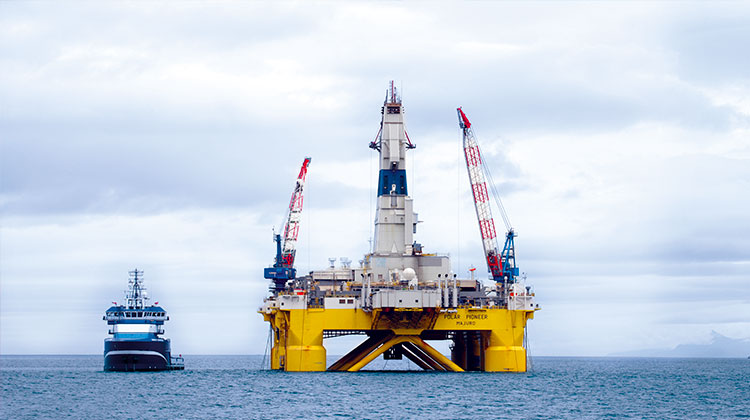Our activities in Alaska
In September 2015, we ended our offshore exploration drilling operations in Alaska for the foreseeable future.
We drilled in Alaska’s outer continental shelf during the summer months of 2015. We successfully met the regulatory safety and environmental standards expected of us. After safely drilling an exploration well in the Burger prospect in the Chukchi Sea, we found that there was insufficient oil for commercial development. This, in part, led us to stop drilling operations in Alaska for the foreseeable future.
This decision reflects the outcome of the Burger J well, and the high costs associated with the project. We support regulation that enforces high safety and environmental standards. However, the unpredictable federal regulatory environment for the Alaska outer continental shelf also made it difficult to operate efficiently. In the summer months of 2016, we will remove the remaining equipment from the drilling sites in Alaska.

The drilling ship Polar Pioneer anchored in Dutch Harbor for the 2015 exploration season, Alaska, USA.
Currently, 6% of the world’s oil and gas comes from the Arctic region, including Alaska, according to Wood Mackenzie. We believe this region will be an important source of energy in the future. However, our drilling in Alaska was an issue that divided public opinion: throughout our operations there was a high level of litigation and environmental activism in opposition to our drilling in the region. While we maintained our focus on safe and successful exploration in 2015, we recognised the concerns of many international non-governmental organisations who do not believe continued fossil fuel extraction from the Arctic is necessary.
Working with communities
Our relationship with local communities, including the indigenous peoples of Alaska’s North Slope, the Iñupiats, played a key role in our operations in Alaska. The Arctic Iñupiat Offshore (AIO) – a company that includes some of Alaska’s North Slope village corporations and the Arctic Slope Village Corporation – took part in discussions with Shell about potential impacts on their lifestyles and livelihoods. Its president, Rex Rock, Sr., was pivotal in the signing of an agreement between AIO and Shell for its members to have an option to share in future oil and gas production from Shell’s Chukchi Sea leases.
An important part of our work with the Iñupiat communities was to create opportunities for jobs and to develop skills that were both sustainable and transferable to other sectors that operate in the region. Shell trained people from the community in skills that included communications, observing marine mammals, working on drill ships and oil-spill response.
Arctic science
Our work in remote areas, such as the Arctic, requires an in-depth understanding of the region’s ecosystem, including its wildlife, marine mammals and wetlands. Shell’s chief environmental scientist for the Arctic, Michael Macrander, has been leading our research efforts over two decades to improve our understanding of the Arctic and, in particular, Alaska.
In Alaska, Shell set up and has funded since 2006, a science programme with the local governments of the North Slope. As part of the agreement, the Iñupiat communities were able to choose subjects for scientific research which included topics of research relating to their traditional way of life.
The scientific research led to a deeper understanding of the birds and mammals in the Arctic region. The work provided insight into migration patterns, the sensitivity of aquatic species to man-made sounds and important patterns of biodiversity.
For example, our science teams investigated whether Shell’s work affected the migration route of the bowhead whale. We found that the bowhead whales tended to avoid areas of seismic activity while on their established migration path. Another scientific discovery – one that the Iñupiat peoples had always supported but western science had disputed – was that the bowhead whale has a sense of smell. These discoveries helped guide our operations to have minimal impact on the Iñupiat peoples’ subsistence activities.
This body of scientific research has established an understanding of Arctic systems and the effect of oil and gas operations on them. The findings help to inform our operations in other sensitive environments and minimise our impacts on local biodiversity. We share our science research with the industry and regulators, and have published our findings in academic journals.

